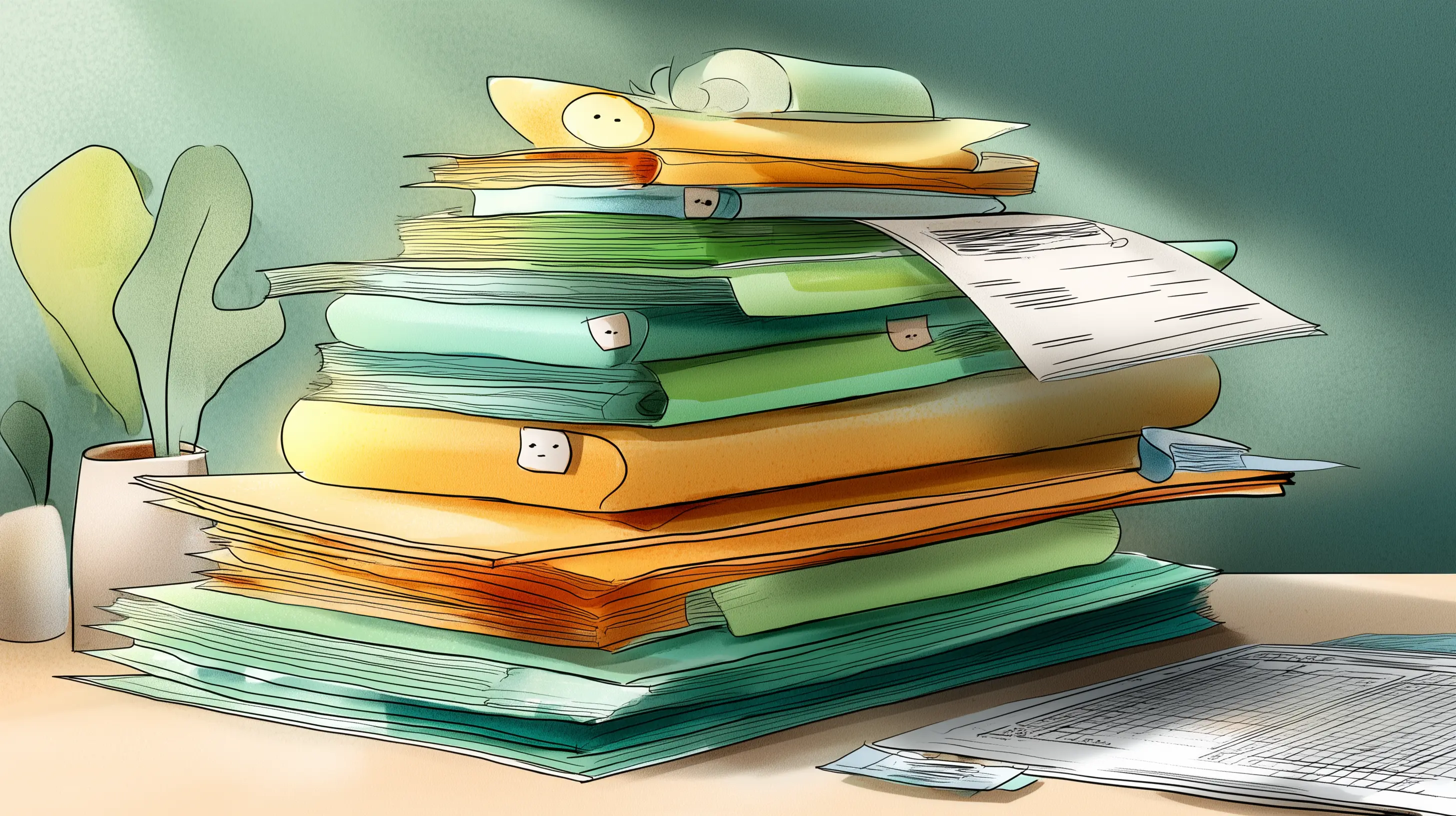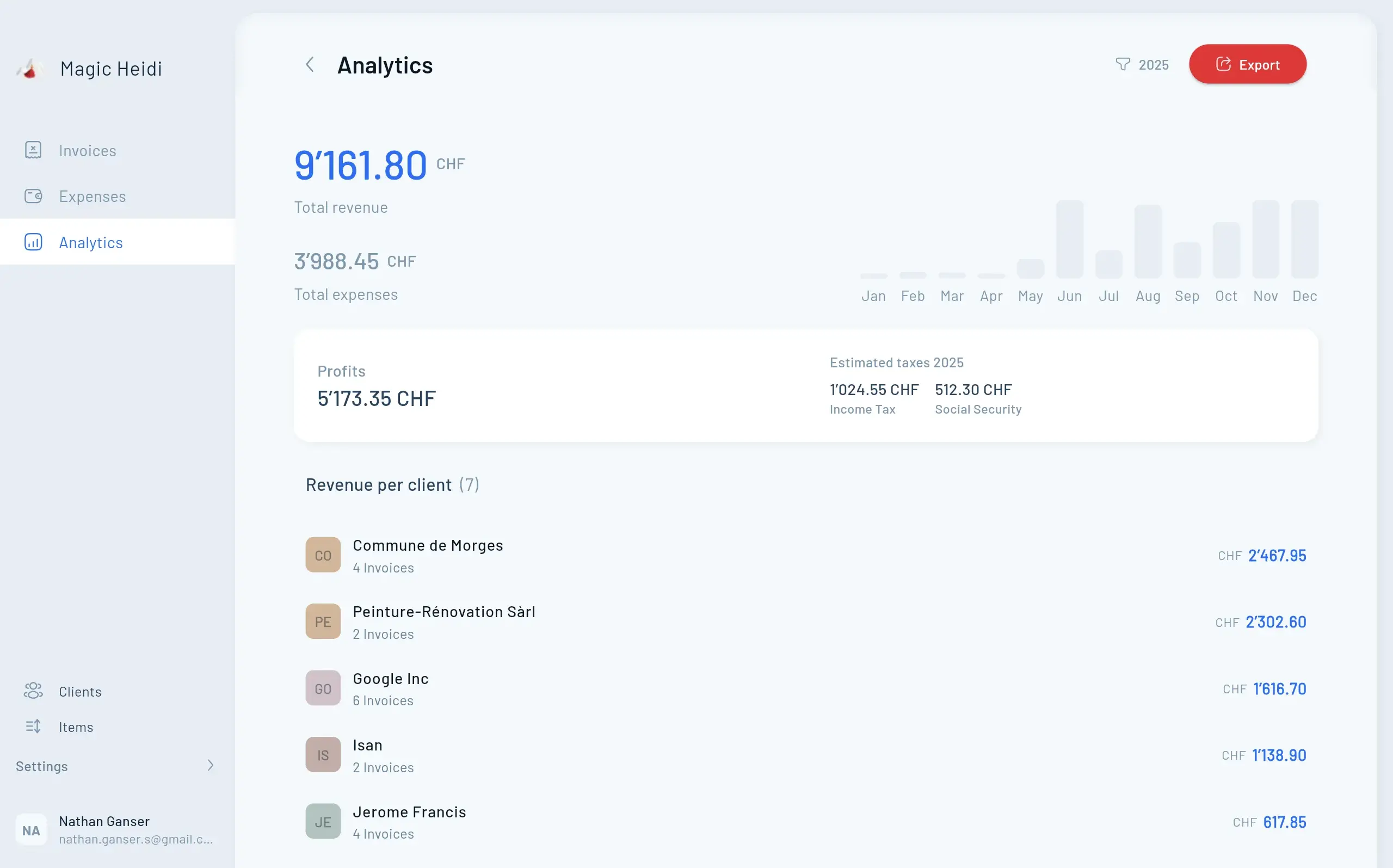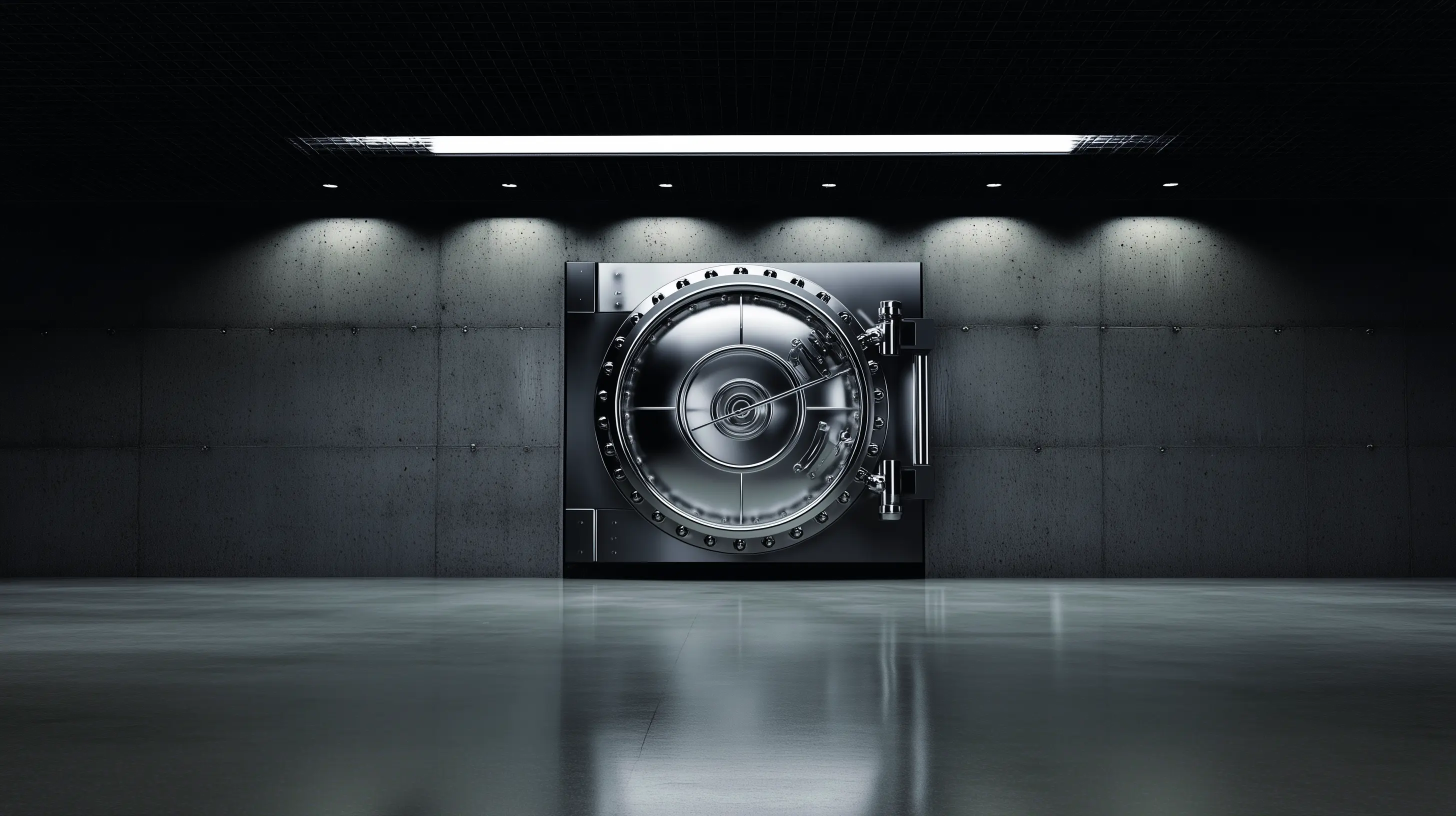Maximizing Tax Deductions for Swiss Freelancers in 2025 (Switzerland)
Checklist, examples, proof requirements, Pillar 3a max, and a simple system to claim every franc—legally.

Maximizing Tax Deductions for Swiss Freelancers in 2025 (Switzerland): A Practical Guide
Taxes don’t have to feel like a penalty for being self-employed. In Switzerland, freelancers and self-employed individuals (Einzelfirma / raison individuelle) can reduce taxable income significantly—if they know what counts as a deductible business expense, apply the right conditions, and keep clean proof.
This guide is built for 2025 reality: more digital administration, stricter expectations around documentation, and high-impact levers like AHV/IV/EO deductions and Pillar 3a planning.
Disclaimer: This is general information for Switzerland. Rules and lump sums vary by canton and individual situation. When in doubt—especially for mixed-use items (car, phone, home office)—ask your cantonal tax office or a fiduciary.
Where Swiss freelancers lose deductions
without noticing
Most missed deductions happen because expenses aren’t captured, categorized, or documented well enough—especially for mixed-use items like home office, car, phone, and hospitality.
Missing receipts
Purchases happen, but proof is lostMixed-use confusion
Home office/phone/car need logic + documentationYear-end rush
Deductions are forgotten or poorly supportedQuick checklist: 15 common tax deductions Swiss freelancers often miss
Use this as a scan-and-go list for tax deductions Switzerland freelancer searches—and as a year-round capture checklist.
- Software subscriptions (design tools, dev tools, CRM, accounting)
- Domain + hosting and business email
- Phone + internet (pro-rata) for business use
- Office supplies (printer ink, paper, postage)
- Professional services (accountant, lawyer, fiduciary)
- Training & continuing education tied to your services (courses, conferences)
- Coworking memberships or rented office space
- Home office (if eligible): pro-rata rent + utilities (cantonal rules apply)
- Business travel (public transport, taxi, parking) for client work
- Mileage (with logbook) for business kilometres (cantonal rate)
- Client hospitality / representation (only with proper documentation; typically limited)
- Professional insurance (liability, legal protection, cyber—if business-related)
- AHV/IV/EO contributions (generally deductible)
- Pillar 3a contributions (big 2025 lever for self-employed without a pension fund)
- Depreciation (Abschreibungen) of equipment (laptop, camera, furniture) over useful life
Now let’s turn that list into a system you can actually apply—without triggering avoidable audit questions.
The 5 core buckets of deductible expenses
Swiss principle: deductible expenses are business-related, necessary, and documented. Categorize everything into these buckets to capture more—cleanly.

The 5 core buckets of deductible expenses (with conditions + proof)
The Swiss principle is simple: deductible expenses are business-related, necessary, and documented. In practice, the easiest way to capture everything is to categorize every cost into one of these buckets.
1) Everyday business & skill-building costs
What usually qualifies
- Office supplies: paper, pens, printer, toner, shipping materials
- Digital operations: domain names, hosting, paid fonts, templates, cloud storage
- Software: Adobe, Figma, JetBrains, Notion, CRM tools, time tracking
- Marketing: website, SEO tools, ads, portfolio printing
- Professional fees: accountant, fiduciary, legal advice, contract templates
- Education: courses, certifications, conferences, trade journals—when they support or improve the services you sell
Proof to keep
- Receipt/invoice with supplier name and date
- Payment record (bank/credit card statement)
- For education: a short note like “Python course to deliver client projects faster” (keep course outline if possible)
Common pitfalls
- Vague “self-improvement” spending without a link to your business
- Mixed-use subscriptions (e.g., streaming) labeled as “research” with no credible business context
Keyword note (DE/FR): This section maps closely to Steuerabzüge Selbständigerwerbende Schweiz, Geschäftsaufwand Abzüge Einzelfirma, and déductions fiscales indépendant Suisse.
2) Workspace & utilities (office, coworking, or home office)
Two clean paths exist:
- Coworking / rented office: usually straightforward—deduct the invoice.
- Home office: potentially valuable, but more scrutiny and stronger conditions.
Expenses that often apply (depending on setup and canton)
- Rent and ancillary costs (Nebenkosten / charges): pro-rata portion for the workspace used for business
- Utilities: heating, electricity, internet (business share)
- Cleaning and small repairs related to the workspace
Proof to keep
- Lease agreement, annual rent statement
- Utility bills (or landlord statements)
- A simple calculation (m² office ÷ total m²) and a short explanation of use
What can go wrong
- Claiming a “home office” that’s actually your living room table
- Claiming the entire rent because you work from home “most days”
- No evidence for how the pro-rata was calculated
We’ll go deeper on home office rules below.
3) Mobility, travel & client work on the move
Typical deductible travel costs
- Public transport tickets and travel cards used for business trips
- Taxis when business-related
- Parking fees for client meetings
- Bike-share / mobility costs for business routes
- Car mileage for business kilometres (rate and handling can be canton-specific)
Proof to keep
- Receipts or transaction records
- Calendar entries or meeting confirmations help support business purpose
- For mileage: a logbook (more on that below)
Pitfall to avoid
- Estimating kilometres at year-end without documentation. If you use a car privately too, a logbook becomes even more important.
4) Client hospitality & representation (strict rules, high audit attention)
This is one of the easiest areas to overclaim—and one of the fastest ways to invite questions.
What may be deductible
- Business meals or coffees with a clear client/business purpose (pitch, project meeting, negotiation)
- Small client gifts (often acceptable when modest—e.g., around CHF 100 or less—depending on canton/practice)
What is usually not deductible
- Your normal daily lunch
- Social outings without a business purpose
- “Networking” costs with no credible documentation of who/why
Documentation you should add to the receipt Write (digitally or on the scan):
- Names of participants / company
- Date and location
- Business purpose (“project kickoff with Client X”)
About percentages Many freelancers hear “50% of meals are deductible.” In reality, deduction limits and interpretation can vary by canton and circumstances. Treat this category as “claimable with strong proof, but conservative” unless your fiduciary confirms the exact handling for your canton.
5) Protection, social security & future security (often the biggest wins)
This bucket is where many Swiss freelancers leave the most money on the table.
Business insurance (often deductible)
- Professional liability insurance
- Legal expenses insurance (if business-related)
- Cyber insurance (especially for consultants/devs handling client data)
Usually not business-deductible
- Standard personal health insurance premiums (typically treated as personal, not business)
AHV/IV/EO contributions (don’t forget these)
Social security contributions for the self-employed are generally a major deductible item. Make sure they’re captured clearly in your records so they don’t get lost between “personal” and “business” thinking.
Pillar 3a (Säule 3a / 3e pilier): 2025 maximum for self-employed
If you’re self-employed without a pension fund (BVG/LPP), Pillar 3a can be a powerful lever.
- Maximum is commonly stated as up to 20% of net income, capped at CHF 36,288 for 2025 (for eligible self-employed without a pension fund).
Source: moneyland.ch (2025 limits overview): https://www.moneyland.ch/en/pillar-3a-maximum-contributions
Why this matters This isn’t an “expense” in the usual sense—it's a year-end planning tool that can materially reduce taxable income.
Proof to keep
- Year-end Pillar 3a contribution certificate from your provider
- A simple note showing how you ensured you stayed within the applicable cap
Assets & depreciation (Abschreibungen)
If equipment lasts beyond one year, you typically deduct it over time. Keep an asset list and a consistent method.

Assets & depreciation (Abschreibungen): the “hidden” deduction many freelancers underuse
If you buy equipment that lasts beyond one year—like a laptop, camera, phone used mainly for work, office furniture—you typically don’t deduct it all at once. Instead, you depreciate it over its useful life.
Common depreciable assets
- IT equipment (laptops, monitors)
- Cameras and audio gear
- Office furniture
- Larger software purchases (depending on structure)
How it works (conceptually)
- You record the asset and then deduct a portion each year according to accepted useful life/rates (federal/cantonal guidance and standard practice).
- Keep it consistent and document your method.
Proof to keep
- Purchase invoice
- Asset list with purchase date, price, and depreciation schedule
- If mixed-use (phone, laptop): a reasonable business-use share and short explanation
Pitfall Guessing depreciation periods or mixing personal gadgets into business assets without a credible business-use rationale.
Home office deduction in Switzerland: eligibility + calculation
Potentially valuable, but needs a defined workspace, a clear pro-rata method, and cantonal-specific caution.

Home office deduction in Switzerland (self-employed): eligibility + calculation
Home office is one of the most searched topics: home office deduction Switzerland self-employed / Homeoffice Abzug Selbständigkeit Schweiz / bureau à domicile déduction.
When a home office is more likely to be accepted
While details vary by canton, the typical expectations include:
- A clearly defined workspace
- Used primarily/exclusively for business
- Not easily described as general living space
- Your work reasonably requires an office setup (admin, calls, project work)
How to calculate it (simple pro-rata method)
- Measure office space (m²) used for business
- Divide by total apartment/house space (m²)
- Apply that percentage to eligible costs (often rent + ancillary costs; sometimes utilities)
Example
- Total apartment: 80 m²
- Office room: 12 m²
- Business share: 12/80 = 15%
- Annual rent + ancillary costs: CHF 30,000
- Potential deductible portion: CHF 4,500 (subject to cantonal practice and your eligibility)
About “flat rates” (e.g., CHF per m²)
Some cantons may allow simplified flat-rate approaches for certain home office costs. Because these lump sums differ and conditions can be strict, treat any blanket number as “check your canton” rather than a guaranteed right.
Best practice If your canton’s eTax/eFiling guidance or a fiduciary suggests a flat rate, save a screenshot or official guidance reference with your tax file.
Mileage deduction: use a logbook
Avoid end-of-year guessing. A simple, consistent logbook is your strongest evidence for business kilometres.

Mileage deduction in practice: logbook template you can copy
If you drive for client work and claim business mileage, your strongest friend is a logbook.
What your mileage logbook should include
For each trip:
- Date
- Start location → destination
- Kilometres
- Client / project
- Business purpose (meeting, delivery, on-site work)
Example calculation (cantonal rate varies)
If you drove 8,000 business kilometres and your cantonal rate is CHF 0.70/km, your deduction could be:
- 8,000 × 0.70 = CHF 5,600
Even if the car is also used privately, a credible logbook helps separate business from personal use.
What’s not deductible (and triggers questions fast)
If you want to maximize deductions, it helps to know what to avoid claiming.
Common red flags:
- Personal entertainment (e.g., Netflix) labeled as “research”
- Wardrobe expenses not clearly required for your profession
- “Home office” without a dedicated workspace
- Daily lunch and routine commuting (often treated as personal)
- Large “rounded” expense numbers with no receipts
- Large mileage claims with no logbook
The goal isn’t to claim less—it’s to claim cleanly.
Recordkeeping in 2025: digital-first wins
Receipts, retention, and clean separation of business spending makes deductions easier—and audits less stressful.

Recordkeeping in 2025: receipts, retention, and why “digital-first” wins
Swiss authorities can request proof. And Switzerland has clear expectations around retention.
Keep accounting records for 10 years
Self-employed individuals are generally required to retain accounting records for ten years (including receipts and key documentation).
Authoritative reference: Swiss SME Portal (kmu.admin.ch) overview on accounting/retention:
https://www.kmu.admin.ch/kmu/en/home/concrete-know-how/finances/accounting-and-auditing/compulsory-accounting.html
Digital receipts are worth it (if you do it right)
A digital workflow is faster and safer than paper:
- Scan or photograph receipts immediately
- Store in a structured system by year and category
- Ensure files are readable and retrievable (test restoring backups)
Simple naming convention2025-03-18_client-meeting_lunch-zh_chf48.50.pdf
Separate money flows (this one change saves deductions)
Use a dedicated business card/account for business spending. Mixing personal and business purchases is one of the fastest ways to:
- miss deductible items
- lose time during tax prep
- create doubt during an audit review
VAT in 2025: the ePortal change
From 1 January 2025, VAT-related online obligations move to the federal ePortal. Clean, categorized bookkeeping becomes even more valuable.

VAT in 2025: the ePortal change you can’t ignore
Even if you’re not VAT-registered today, digital administration is becoming the norm.
From 1 January 2025, VAT processes require using the federal ePortal for VAT-related online obligations (paper is being phased out).
Official reference (ESTV/FTA): https://www.estv.admin.ch/estv/en/home/value-added-tax/vat-tax-liability/online-obligation.html
Why it matters for deductions The more digital your VAT and accounting obligations become, the more valuable a clean, categorized, receipt-backed bookkeeping workflow is—especially if you plan to cross the VAT threshold later.
A simple workflow to capture more deductions (without living in spreadsheets)
Maximizing Swiss self-employed deductible expenses isn’t about being “good at taxes.” It’s about building a capture system that makes deductions unavoidable.
The 10-minute weekly routine
- Scan/forward receipts (or snap photos)
- Categorize each expense into one of the 5 buckets
- Add notes for hospitality + mixed-use items
- Reconcile with bank transactions (so nothing is missed)
Quarterly review (the “extra deductions” step)
Once per quarter, review:
- Income statement: Are any expense categories missing (software, travel, insurance)?
- Assets: Did you buy equipment that should be depreciated?
- Year-end planning: Are you on track for Pillar 3a maximum contributions?
Tools that make this easier
You can do this manually, but most missed deductions come from missed capture. Use a workflow (and tools) you’ll actually stick to.
A few Swiss-friendly options:
- bexio: robust SME bookkeeping, bank import, VAT support (good if you want full accounting).
- CashCtrl: solid option with a free tier; Swiss-hosted positioning.
- Magic Heidi: built for freelancers—quick invoicing + expenses, designed to make receipt capture and categorization easier (including QR-bill workflows).
If you want the simplest path to “better records with less effort,” start with an expense workflow you’ll actually stick to.
Swiss freelancer tax deductions (2025)
What expenses are deductible as a Swiss freelancer?
Generally, expenses that are necessary to earn your self-employed income and are documented: software, professional fees, business travel, training tied to your services, eligible workspace costs, insurance, and depreciation of equipment.
Can I deduct home office in Switzerland as self-employed?
Often yes if you have a dedicated workspace used primarily/exclusively for business and you calculate it reasonably (typically pro-rata by m²). Cantonal practice varies—keep proof and a clear calculation.
Can I deduct my daily lunch?
Usually no. Client meals with a clear business purpose may be partially deductible, but your normal lunch is generally personal.
How do I deduct phone and internet costs?
If they’re mixed-use, claim a reasonable business-use percentage and keep supporting logic (e.g., client calls, work hotspot use, business subscriptions).
What records do I need for mileage deductions?
A logbook with date, route, kilometres, client, and business purpose. Avoid end-of-year estimates without evidence.
What is the Pillar 3a maximum contribution in 2025 for self-employed?
Often cited for eligible self-employed without a pension fund: up to 20% of net income, capped at CHF 36,288 (2025). Confirm your eligibility and keep the contribution certificate. Reference: https://www.moneyland.ch/en/pillar-3a-maximum-contributions
Are AHV/IV/EO contributions deductible?
They are commonly deductible and are a major item for many freelancers. Capture them clearly in your system.
How long do I need to keep receipts in Switzerland?
Commonly 10 years, including receipts and accounting records (electronic archiving is acceptable when done properly). Reference: https://www.kmu.admin.ch/kmu/en/home/concrete-know-how/finances/accounting-and-auditing/compulsory-accounting.html
What changed for VAT in 2025?
VAT-related online obligations moved to the federal ePortal from 1 January 2025. Reference: https://www.estv.admin.ch/estv/en/home/value-added-tax/vat-tax-liability/online-obligation.html
When should I hire a fiduciary?
Consider it if you have VAT complexity, foreign clients, big income swings, significant assets/depreciation, or if you’re unsure about mixed-use deductions (car, home office, phone). A good fiduciary often pays for itself in reduced tax and reduced risk.
Conclusion: claim every franc—legally, confidently, and with less stress
Maximizing tax deductions in Switzerland isn’t about “finding loopholes.” It’s about capturing legitimate business costs, documenting them properly, and using the biggest levers (like Pillar 3a and depreciation) intentionally.
If you do three things, you’ll already be ahead of most freelancers:
- Categorize every expense into the right bucket
- Keep receipts (digitally) and separate business spending
- Review quarterly so year-end deductions aren’t rushed or forgotten
Ready to make deductions automatic instead of stressful?
Make deductions automatic—not stressful
Capture receipts as you go, keep expenses categorized, and walk into tax season with clean proof already organized.